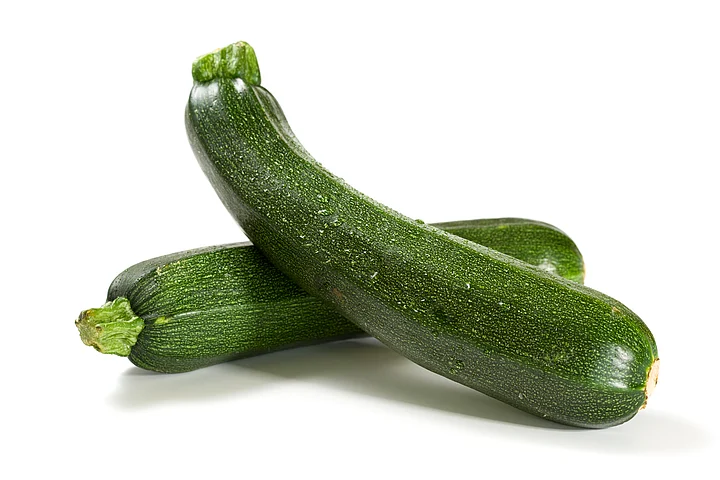Health Benefits of Zucchini: Also known as courgette, zucchini is a summer squash that grows in the Cucurbitaceae plant family, which also includes melons, spaghetti squash and cucumbers.
Zucchini is usually harvested when immature, typically measuring under 8 inches (20 cm). It can grow up to 3.2 feet (1 meter) in length, but is most commonly harvested when young. It has a variety of colors, ranging from deep yellow to dark green.
Squashes originated in the Americas, but the zucchini variety was first developed in the early 1800s in Italy. The vegetable is rich in nutrients, and including it in your diet can have a variety of health benefits. Let us read about some of the amazing health benefits of zucchini below.
7 Amazing Health Benefits of Zucchini
Following are some of the top health benefits of zucchini.
1. Regulates Blood Sugar: Zucchini has low carbohydrate content, which makes it an excellent alternative to high-carb foods for individuals managing type 2 diabetes. With just 3 grams of carbs per cooked cup, it can be used as a low-carb substitute for pasta dishes. Spiralizing or slicing zucchini allows for creative replacements in recipes, contributing to stable blood sugar levels and potentially reducing the need for medication in those with type 2 diabetes. Animal studies suggest that zucchini peel extract may also help lower blood sugar and insulin levels due to its potent antioxidants, although human research is still needed to confirm these findings.
2. Improves Vision: Incorporating zucchini into your diet can support your vision. Rich in vitamin C and beta-carotene, both crucial for eye health, zucchini also contains the antioxidants lutein and zeaxanthin. These antioxidants accumulate in the retina, improving vision and reducing the risk of age-related eye diseases. Lutein and zeaxanthin have been linked to a lower risk of macular degeneration, a leading cause of irreversible vision loss in older adults. Additionally, diets high in lutein and zeaxanthin may reduce the likelihood of developing cataracts, a clouding of the lens that can impair eyesight.
3. Reduces Cancer Risk: Research suggests that zucchini and summer squash may have potential benefits in cancer prevention. The antioxidant zeaxanthin plays a key role in this, potentially aiding in preventing oxidative stress and reducing cancer risk. Other antioxidants, including phenolics, carotenoids, chlorophylls, and vitamin C, may also contribute to cancer prevention. Diets rich in these bioactive compounds have been associated with a lower risk of cancers of the esophagus, stomach, mouth, pharynx, and larynx.
4. Strengthens Bone Health: Studies indicate that potassium, found in zucchini, can improve bone mineral status and bone mineral density. A higher intake of magnesium, also present in zucchini, is linked to higher bone mineral density, reducing the risk of bone fractures and osteoporosis. Calcium, another essential nutrient in zucchini, plays a crucial role in maintaining bone health.
5. Provides Essential Nutrients: Instead of peeling zucchini, consider leaving the skin on. The skin is packed with vitamin C, vitamin B6, and a good source of fiber. Fiber aids in regular digestion and keeps you feeling full for longer. Just remember to scrub the peel thoroughly before consuming it for safety.
6. Supports Heart Health: Zucchini contributes to heart health, primarily due to its high fiber content. Observational studies show that individuals with higher fiber intake have a lower risk of heart disease. Pectin, a soluble fiber in zucchini, effectively reduces total and LDL cholesterol levels. Consuming as little as 2-10 grams of soluble fiber per day for around 1-2 months can significantly lower cholesterol levels. Zucchini's potassium content also helps reduce high blood pressure by dilating blood vessels, contributing to a lower risk of heart disease and stroke. Diets rich in carotenoids, found in zucchini, offer additional protection against heart disease.
7. Promotes Digestive Health: Zucchini plays a role in promoting healthy digestion in several ways. Its high water content softens stools, making them easier to pass and reducing the risk of constipation. Zucchini contains both soluble and insoluble fiber. Insoluble fiber adds bulk to stools and aids in their movement through the gut, further reducing constipation risk, especially when combined with adequate fluid intake. Soluble fiber nourishes beneficial bacteria in the gut, which produce short-chain fatty acids (SCFAs) that nourish gut cells. These SCFAs may help reduce inflammation and alleviate symptoms of certain gut disorders, such as irritable bowel syndrome (IBS), Crohn's disease, and ulcerative colitis.
(Disclaimer: Parts of this article were generated by AI and published after the content was editorially modified and verified by a human based on their own judgement and expertise. The Quint does not publish AI-generated content without direct human involvement and oversight).
(At The Quint, we question everything. Play an active role in shaping our journalism by becoming a member today.)
